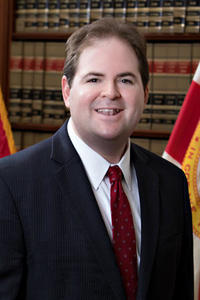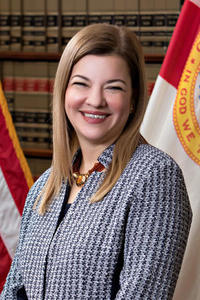Circuit Judges Should Recuse from Voting Case

 Fix the Court is calling for two Eleventh Circuit judges to recuse from 20-12003, Jones v. DeSantis, a voting rights case that will be argued en banc on Aug. 18.
Fix the Court is calling for two Eleventh Circuit judges to recuse from 20-12003, Jones v. DeSantis, a voting rights case that will be argued en banc on Aug. 18.
Both judges, Barbara Lagoa and Robert Luck, heard arguments on the matter on Nov. 6, 2019, when they were on the Florida Supreme Court. There’s even video evidence of their participation.
FTC’s executive director Gabe Roth issued the following statement:
The continued participation of Judges Lagoa and Luck in Jones v. DeSantis is an affront to the integrity of the judiciary.
The judges are bound by the Code of Conduct, which explicitly forbids them from sitting on a case if they’ve ruled on the matter in a previous judicial role. The two have already violated the code by voting in the en banc poll, and they continue to do so by remaining on the case.
If judges cannot uphold their basic ethical obligations, the public has little reason to place its trust in our courts system.
The case in question concerns a Florida law requiring recently re-enfranchised ex-felons to pay fines and fees before regaining the right to vote. Critics say the requirement constitutes a modern-day poll tax.
As Florida Supreme Court justices, Lagoa and Luck sat for Nov. 6 oral arguments concerning an advisory opinion that Gov. Ron DeSantis requested on the matter. It makes no difference that the opinion itself was released on Jan. 16, weeks after the judges were appointed to the federal bench (Luck was sworn in on Nov. 19; Lagoa, on Dec. 6). Their participation in oral arguments should preclude any ongoing participation in the Eleventh Circuit.
(The opinion was ultimately released per curiam. In it, the justices write that the state is permitted to condition voting on ex-felons’ payments of fines because being a felon isn’t just about a prison sentence, it also “encompasses [any fines] imposed in conjunction with an adjudication of guilt” [p. 2].)
Despite this history with the case, both judges voted on July 1 to hear an appeal en banc, which runs afoul of the Code of Conduct for U.S. Judges. The code states that a judge should be disqualified from a proceeding if he or she “participated as a judge (in a previous judicial position)” (Cannon 3(C)(1)(e)).
Their participation is especially galling because in their testimony to the Senate Judiciary Committee, they explicitly committed to recusing from matters that they had previously been involved with while on the Florida Supreme Court. The ten Democrats on the committee called on the two judges yesterday to explain why they believe they shouldn’t recuse.
Initial calls for recusal included a third judge, Andrew Brasher, who defended a similar law when serving as Alabama’s solicitor general. As of last night, Brasher is now recused, not due to his previous participation in the case, he says, but because his previous employer, the Alabama attorney general, submitted an amicus brief in Jones.